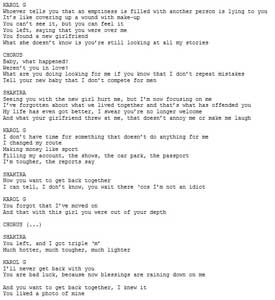‘No pues que muy tragadito’ – meaning. Decoding the Artistry and Potential Effects of ‘TQG’ by KAROL G and Shakira and the meaning in Colombia of Tragadito (Tragaíto). A Harmless Pop Song or Does it Perpetuate Negative Messages? Exploring the Themes and Social Impact.
This article will provide you with the original meaning of the Colombian word „tragadito,“ which is pronounced as „tragaito“ in the famous Latin pop song „TQG“ by KAROL G and the star Shakira. We will also share some other meanings that are essential to know if you want to understand this popular song correctly. We explore the artistic merits of the music, such as its creative wordplay and vivid imagery, as well as some potential artistic flaws, including repetition and lack of complexity.
We also discuss the potential impact the song could have on listeners and society, examining its positive and negative effects. Overall, our article provides a nuanced analysis of the themes and social implications of „TQG,“ offering insights into this popular pop song’s artistic and cultural significance.
The meaning of the word Tragadito (Tragaíto)
„Tragadito (Tragaíto)“ is a slang word in Spanish used in the song „TQG“ by KAROL G and Shakira. The term is derived from the verb „tragar,“ which means „to swallow“ or „to eat.“ In the song, „tragaíto“ is used as a suffix to the word „traga,“ which means „big eater“ or „glutton.“ In this context, „tragaíto“ describes someone overly eager or greedy, especially in love or relationships.
You Can Buy Now: Beamandi Karol G Shoe Charms Manana Sera Bonito Shoe Decoration Charms
In the lyrics of „TQG,“ the phrase „no pues que muy tragadito“ is used as a rhetorical question to challenge the ex-partner’s behavior. It roughly translates to „weren’t you the big eater?“ (tragaíto) and is used to question the ex-partner’s motives for looking for the singer after they have moved on.
Overall, „tragaíto“ is a slang word commonly used in Latin American countries, and its meaning can vary depending on the context. In the context of the song „TQG“ conveys a sense of greed or eagerness in relationships.
What is its origin?
The word’s exact origin is unclear, but it is thought to have developed from the verb „tragar“ and may have been used in Latin American slang for many years. In general, slang words like „tragaíto“ often have uncertain origins and can be challenging to trace back to a specific time or place. They develop and evolve through common usage and are often associated with specific cultural groups or subcultures. In the case of „tragaíto,“ it is primarily used in relationships and is often associated with Latin American culture and music.
In what cases is it usually used?
The term is often used negatively to describe someone overly possessive or clingy in a relationship. In the context of the song „TQG“ by KAROL G and Shakira, the term describes an ex-partner still trying to pursue the singer even though they have moved on to a new relationship. The phrase „no pues que muy tragadito“ is used as a rhetorical question to challenge the ex-partner’s behavior and suggest they are overly eager or greedy in their attempts to reconnect with the singer.
You Can Buy Now: Fancy Hair Ombre Wig Bluish Light Blue Wigs Long Curly Wavy Hair
In what sense do Shakira and Carol G use it?
Shakira also references the term „tragaíto“ in the song’s third verse. There she says, „Tú buscando por fuera la comida, yo diciendo que era monotonía,“ which roughly translates to „You looking for food on the outside, me saying it was monotonous.“ In this context, the term describes a situation where the ex-partner seeks something new or different outside of the relationship, while Shakira is content with the status quo.
The interest in the meaning of the word „tragaíto“ likely increased after KAROL G and Shakira’s release of the song „TQG“. Due to its popularity and the widespread interest in its lyrics, many searches appeared on Google. As the song gained popularity, many unfamiliar with the slang term „tragaíto“ became curious about its meaning and origin.
Additionally, using slang terms like „tragaíto“ in music and pop culture can often generate interest and curiosity among fans who want to understand the meaning and context of the words. As „TQG“ became a hit song played on radio stations and streaming services worldwide, it’s likely that more and more people became curious about the meaning of the word „tragaíto“ and sought information about it online.
The song „TQG“ by KAROL G and Shakira is about a past relationship and the breakup’s aftermath. The lyrics portray a woman who has moved on from her ex-partner and is focused on herself, while the ex-partner is struggling to let go and is still looking at the woman’s social media stories. The chorus questions why the ex-partner is still trying to contact the woman if he knows that she won’t repeat past mistakes and won’t compete for him.
Here is the text: Karol G & Shakira, TQG: the English lyrics
The lyrics suggest that the ex-partner is trying to return to the woman. He has realized that his life without her is not as good as he thought. However, the woman has moved on and is not interested in repeating past mistakes. The lyrics also imply that the ex-partner is dishonest and still looking for the woman, even though he has a new girlfriend.
The song provides a commentary on the dynamic of power in relationships. Also, we see the ability of women to move on and thrive after a breakup. The lyrics suggest that the woman has grown more substantial and thriving after the separation. The man struggles to move on and still hangs up on the past. The Spanish phrase „TQG“ (You were out of your depth) at the song’s end is a final statement of power, indicating that the woman has moved on and is no longer interested in the man.
What artistic tricks can we find in the text:
One artistic trick used in the original Spanish text of „TQG“ is figurative language, such as metaphors and similes, to convey the singers’ emotions. For example, in the first verse, Karol G compares filling an emotional emptiness with another person to covering up a wound with makeup. This metaphor creates a powerful image of a surface-level solution that does not address the deeper problem. Similarly, in the same verse, Karol G uses a simile to describe the ex-partner’s new girlfriend as someone who is not aware of the man’s continued interest in Karol G’s life.
You Can Buy Now: NAVISA-Karol G keychain, karol g red hair 3D, llavero Bichota
Another artistic trick the song uses is the repetition of specific phrases and words, such as „¿Qué fue?“ and „No repito errores.“ This repetition creates a catchy, memorable rhythm and emphasizes the song’s central themes. The repetition of these phrases also creates a sense of defiance and confidence. We may say that the singers refuse to repeat the mistakes they made in the past.
Using spoken words at the song’s end adds a personal touch and creates a sense of intimacy between the singer and the listener. The final line, „TQM pero TQG,“ is a powerful statement that reinforces the theme of moving on and letting go of the past. Overall, the artistic tricks used in the song help to convey the complex emotions and pieces of the lyrics while also creating a catchy and memorable tune.
The lyrics to „TQG“ reveal several indications of the author’s talent, including:
- Creative Wordplay: The lyrics feature clever wordplay, such as the use of the word „Tragadito (Tragaíto)“ to mean „swallowed“ or „digested,“ which is a play on the word „tragado“, meaning „devoured.“ It shows skilful use of language and a willingness to experiment with words to create exciting and memorable phrases.
- Vivid Imagery: The lyrics also use vivid imagery to convey emotion and meaning, such as the metaphor of „covering up a wound with makeup“ and the simile of the ex-partner’s new girlfriend as someone who is „not aware of the man’s continued interest in Karol G’s life.“ This use of vivid imagery helps to create a clear mental picture of the emotions and situations described in the song.
- Catchy Hooks: The song’s chorus features a catchy hook with a memorable melody and rhythm that makes the music easy to sing and remember. It signifies the author’s ability to write catchy, unforgettable songs that resonate with audiences.
- Strong Narrative: The song tells a clear and compelling story with a beginning, middle, and end. The lyrics explore the aftermath of a breakup and the emotions that come with it, including hurt, anger, and, ultimately, moving on. The strong narrative helps to create a sense of emotional depth and makes the song more relatable to listeners.
Overall, the talent of the author of „TQG“ is evident in the skilful use of language, vivid imagery, catchy hooks, and strong narrative that make the song memorable and emotionally resonant.
Artistic flaws
While the lyrics to „TQG“ demonstrate the author’s talent, the text has a few artistic flaws. These include:
- Repetition: While repetition can be an effective artistic tool, it can also become excessive and repetitive. In „TQG,“ some phrases and words are repeated excessively. We hear „¿Qué fue?“ in the chorus and the repetition of the word „me“ in the first verse. It can make the lyrics feel monotonous and less impactful.
- Lack of Originality: Some of the phrases and ideas in the lyrics could be more original and unique. For example, many other songs and poems have used the metaphor of covering up a wound with makeup. While the author does put a unique spin on the analogy, it can still feel cliché.
- Lack of Complexity: While the lyrics tell a clear and compelling story, they could be more complex and nuanced. The song’s themes are common in pop music and could be more groundbreaking. This lack of complexity can make the song feel predictable and less emotionally resonant.
While the lyrics to „TQG“ demonstrate the author’s talent, they also feature some artistic flaws, such as repetition, lack of originality, and lack of complexity.
It is difficult to say whether „TQG“ by KAROL G and Shakira contributes to its listeners’ higher morality, prosperity, and happy life. The song primarily focuses on the aftermath of a breakup. It tells about the emotions that come with it, including hurt, anger, and moving on. While the lyrics may resonate with some listeners going through a similar situation, it is still being determined. We see how much of an impact the song would have on the overall well-being of its listeners.
That being said, music can certainly have a positive impact on listeners’ lives. Listening to music can improve mood, reduce stress, and promote relaxation. The lyrics of a song can also inspire listeners and provide them with a sense of hope and optimism.
While „TQG“ may not necessarily contribute directly to higher morality or prosperity, it could positively impact listeners’ emotional well-being. By providing a space for listeners to process their emotions and relate to the experiences of the singers, the song may promote a sense of community and emotional support. Additionally, the song’s catchy melody and upbeat tempo could provide listeners with a brief escape from the stresses of daily life and promote a sense of joy and positivity.
What listeners is this song for?
„TQG“ by KAROL G and Shakira is a pop song with a Latin-American influence primarily targeted towards young adult listeners, particularly those who enjoy Latin pop music. The song has universal themes of love and heartbreak, making it relatable to many listeners.
Regarding society’s demographic and social circles, the song’s audience is likely to be primarily Spanish-speaking, focusing on Latin American and Hispanic communities in particular. The theme can appeal to a wide range of age groups, although it is likely to be most popular among young adults and teenagers.
The song’s upbeat and catchy melody, as well as its themes of love and heartbreak, make it suitable for a variety of social contexts. It could be played in clubs and bars, as well as at social events and parties. It could also be enjoyed in private settings, such as at home or on personal music devices. Overall, „TQG“ is a song likely to appeal to a wide range of young adult listeners who enjoy Latin pop music and have experienced or are experiencing the ups and downs of romantic relationships.
How can this song harm listeners and society?
It is important to note that music can have a powerful influence on individuals and society, both positive and negative. While „TQG“ by KAROL G and Shakira is a relatively harmless and mainstream pop song, there are a few potential ways in which it could harm listeners and society:
- Reinforcement of Negative Relationship Patterns: While the lyrics of „TQG“ promote a sense of moving on and not repeating past mistakes, some listeners may interpret the song’s message as promoting unhealthy relationship patterns, such as jealousy and jealousy possessiveness. If listeners internalize these messages, they may be more likely to engage in controlling or harmful behaviours in their relationships.
- Reinforcement of Gender Stereotypes: The lyrics of „TQG“ could also reinforce gender stereotypes by perpetuating the idea that men are unfaithful and women are emotional and vulnerable. It could harm both men and women, as it strengthens limiting and harmful gender roles.
- Normalization of Revenge: Some lyrics in „TQG“ suggest a desire for revenge, such as „Tell your new baby that I don’t compete for men.“ This normalization of revenge could encourage listeners to engage in harmful behaviours and perpetuate a cycle of harm and retaliation.
While „TQG“ is not inherently harmful, it could reinforce negative relationship patterns, perpetuate harmful gender stereotypes, and normalize revenge. It is important for listeners to engage with the lyrics and messages of the song critically and to consider the potential impact it could have on their behaviours and attitudes.
Conclusion
In conclusion, our article analyses the famous Latin pop song „TQG“ by KAROL G and Shakira. While the piece demonstrates the authors’ talent and creative wordplay, it also features some artistic flaws, such as repetition and lack of originality. Additionally, we explore the potential impact of the song on listeners and society, including both positive and negative effects. We highlight potential harm from reinforcing negative relationship patterns, perpetuating harmful gender stereotypes, and normalizing revenge.
Our article shows that music can have a powerful influence on individuals and society, and it is important for listeners to critically engage with the messages and themes presented in the music they consume. By being aware of the potential impact of music, we can better understand the cultural significance of songs like „TQG“ and make more informed choices about the media we consume.
We encourage you to share this article on your social networks if you find it interesting or insightful. We can create a more informed and thoughtful society by spreading awareness and promoting critical engagement with popular culture.
FAQ
- Who wrote the song TQG? „TQG“ was written by KAROL G, Shakira, Keityn, Jowan, Kevin ADG, Chan El Genio, and Ovy on the Drums.
- What is the central message of the song TQG? The main message of „TQG“ is about moving on from a past relationship and finding strength in oneself. The lyrics suggest that it is essential to recognize when a relationship is not working and not to repeat past mistakes.
- Is TQG a popular song? Yes, „TQG“ has been a popular song since its release. It has over 10 million views on YouTube.
- What genre of music is TQG? „TQG“ is a Latin pop song with a reggaeton beat. It features elements of urban and trap music and some traditional Latin American instruments and rhythms.
Full Text Lyrics
La que te dijo que un vacío se llena
Con otra persona te miente
Es como tapar una herida con maquillaje
No se ve, pero se siente
Te fuiste diciendo que me superaste (ey)
Y te conseguiste nueva novia
Lo que ella no sabe es que tú todavía (oh)
Me esta’ viendo toa’ la’ historia’ (papi)
Bebé, ¿qué fue?
¿No pues que muy tragadito?
¿Qué haces buscándome el la’o
Si sabes que yo errores no repito? (Ey, papi)
Dile a tu nueva bebé
Que por hombres no compito
Que deje de estar tirando
Que al meno’ yo te tenía bonito
Verte con la nueva me dolió
Pero ya estoy puesta pa’ lo mío
Lo que vivimos se me olvidó
Y eso e’ lo que te tiene ofendido
Que hasta la vida me mejoró
Por acá ya no eres bienvenido
Vi lo que tu novia me tiró
Eso no da ni rabia, yo me río, yo me río
No tengo tiempo pa’ lo que no aporte, ya cambié mi norte
Haciendo dinero como deporte (ah)
Llenando la cuenta, los show’, el parking y el pasaporte (ey)
‘Toy más dura dicen los reporte’
Ahora tú quieres volver, se te nota, mmm, sí
‘Pérame ahí, que yo soy idiota (ah)
Se te olvidó que estoy en otra
Y que te quedó grande La Bichota
Bebé, ¿qué fue? (Fue)
¿No pues que muy tragadito? (Ah)
¿Qué haces buscándome el la’o (ey)
Si sabes que yo errores no repito?
Dile a tu nueva bebé
Que por hombres no compito
Que deje de estar tirando
Que al meno’ yo te tenía bonito
Tú te fuiste y yo me puse triple M
Más buena, más dura, más level
Volver contigo never, tú eres la mala suerte
Porque ahora la’ bendicione’ me llueven
Y quiere’ volver, ya lo suponía
Dándole like a la foto mía
Tú buscando por fuera la comida
Yo diciendo que era monotonía
Y ahora quieres volver, ya lo suponía
Dándole like a la foto mía
Te ves feliz con tu nueva vida pero
Si ella supiera que me busca’ todavía
Bebé, ¿qué fue?
¿No pues que muy tragadito? (Ah)
¿Qué haces buscándome el la’o (ey)
Si sabes que yo errores no repito?
Dile a tu nueva bebé
Que por hombres no compito (mueve el culito)
Que no tiene buena mano
Y al menos yo te tenía bonito

Маргарита Алексиева е утвърден редактор в здравните и техническите рубрики на множество национални и регионални всекидневници и седмични издания. Завършила е медицинска техника в ТУ. С над 30-годишен опит в журналистиката, кариерата ѝ започва през 1992 г. През последното десетилетие тя се специализира предимно в областите на здравеопазването, медицината, техниката и актуалните новини в сферата на общественото здраве.




I find ‘TQG’ quite superficial and lacking in substance. While it’s catchy and fun to listen to, it doesn’t have much to say or any real message. I prefer music that is more thought-provoking and meaningful.
I’m not a fan of ‘TQG’ because it reinforces negative gender stereotypes, portraying women as emotional and vulnerable and men as unfaithful and unreliable. I think it’s important to move away from these limiting and harmful gender roles in popular culture.
As a fan of more complex and innovative music, I find ‘TQG’ quite repetitive and unoriginal. The melody and beat are catchy but lack the depth and complexity I look for in music.
I don’t like ‘TQG’ because the lyrics promote a sense of jealousy and possessiveness that I find concerning. The song suggests that it’s normal to feel hurt and angry when your ex moves on, which can lead to unhealthy behaviors and controlling attitudes in relationships.
As someone who values originality and creativity in music, I find ‘TQG’ quite formulaic and predictable. The melody and beat are similar to many other pop songs, and the theme does not stand out or offer anything new or innovative.